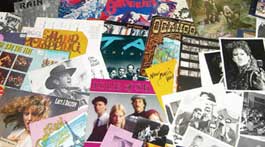home | metro santa cruz index | music & nightlife | band review

Vinyl Exam: Spot Rick Walker and Rob Brezsny and win ... um, nothing.
A Bum in Santa Cruz
Ukulele Dick presents the Santa Cruz Music Archives
By Mike Connor
I'd say goodbye to friends I know
(Bye bye!)
Old granddad and Old Crow
I'd be a much better guy,
my ambition is high
To be a bum in Santa Cruz!
—From 'A Bum In Santa Cruz,' 1934
Way back in the day, before radio was invented, ad agencies employed songwriters to write jingles for their clients, which were distributed as sheet music on handouts or in newspapers. You, the reader, could then proceed to the piano, where you'd dutifully pound out the latest commercials. It's like having the sheet music to "I'm lovin' it," except the songs were much, much better.
Local historian and musician Ross Eric Gibson spent years compiling the old jingles into the Santa Cruz County Songbook, and even took the time to lay down 16 of the songs on tape. Rick McKee, better known as Ukulele Dick, keeps a copy of Gibson's cassette in a collection of local music memorabilia he calls—grandly—the Santa Cruz Music Archives. For the month of December, the Attic will host a series of performances of and lectures about local music, all amid a display of the archive itself.
It's a project McKee's been accumulating since 1975, when he was working as a repairman at Santa Cruz Guitar Works. He was already well acquainted with the local music scene when a guy named Red from a band called One Hand Clapping gave him a demo tape.
"For some reason it just threw the spark," says McKee. "Like, duh, I have all these clients that have product. Why not just create a local music archive?"
So he started collecting, and over the years has amassed a collection with thousands of LPs, 45s, cassettes, CDs, videos, reel-to-reel tapes, posters, T-shirts, programs, business cards—the list goes on and on. He's collected pieces at library sales, garage sales and flea markets, but for the most part, word-of-mouth kept the project growing, like some funky kind of fungus, in McKee's garage.
McKee's ultimate dream for the archives is to open up a cafe where they'll live in splendorous recognition, along with listening stations and a small stage for intimate performances. Part of the impetus for the show at the Attic is to get the word out to any potential cafe collaborators. Already, he has connected with one possible taker.
But for now, the biggest challenge McKee is facing is actually hanging the show, which is almost impossibly gigantic.
"I have a plan," says McKee assuringly, explaining that he'll connect records in long trains with Saran Wrap and hang them from the ceiling in giant LP ribbons. He and whoever he can wrangle to help will load into the Attic on Nov. 30—Dick Clark's birthday and the day George Harrison died—and work all through the night and the next day to get it ready in time for the Dec. 2 reception. McKee hopes to draw attention to this lush history, because there must be some lessons to be learned about Santa Cruz from this historical treasure trove ... such as?
"Disco never caught on [here]," McKee points out.
But over the course of our conversation, a larger pattern emerged. Sometime between the ad jingles of yore and the present, music became more than just a means to an advertising end. But to this day, musicians still struggle in this county trying to make a living simply entertaining others.
"I don't believe there's any venue in Santa Cruz that is a springboard to stardom," says McKee. "Any venue in this town is not where you go to be seen by famous producers and get your big break."
McKee says that Santa Cruz has long served as a breeding ground for international music and artists with quirky ideas, but the scene isn't set up to pay off. Sure, there are people like Joe Sharino and other professional musicians making a living in Santa Cruz, but McKee says the money they make is "primarily from weddings, parties, corporate gigs. ... Very few of them make that money just staying in Santa Cruz."
Still, McKee is quick to point out an exception to the rule.
"There's a woman who lived on the West Side," says McKee. "She got into the jingle writing business. She would sit at home with her acoustic guitar and a microphone and knock out these jingles. National jingles—McDonald's, K-mart—but she was one of the few that was able to do it."
Historians like Gibson might recognize the irony here, but McKee hopes the cafe will help to change all that by spreading the gospel of Santa Cruz music via both a physical and an online presence.
"I'm pretty convinced," says McKee, "that if we get this little cafe started, within a year or so we'll be able to garner some national attention."
In the meantime, McKee says he and a lot of his friends and clients have a little secret about how they continue making music without making money:
"They keep their day jobs."
The Santa Cruz Music Archives opens Friday, Dec. 2, at 5pm at the Attic, 931 Pacific Ave., Santa Cruz, and runs through Dec. 31. For information about performances associated with the show, call 831.460.1800 or visit www.theatticsantacruz.com.
Send a letter to the editor about this story.